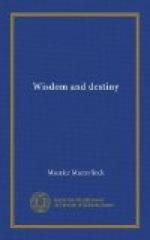44. But if it be not our reason that chooses what suffering shall bring us, whereby is the choice then made? By the life we have lived till then, the life that has moulded our soul. Wisdom matures but slowly; her fruits shall not quickly be gathered. If my life has not been as that of Paulus Aemilius, there shall be no comfort for me in the thoughts whereby he was consoled, not though every sage in the world were to come and repeat them to me. The angels that dry our eyes bear the form and the features of all we have said and thought--above all, of what we have done, prior to the hour of misfortune. When Thomas Carlyle (a sage, although somewhat morbid) lost the wife he had tenderly loved, with whom he had lived forty years, then did his sorrow too, with marvellous exactness, become as had been the bygone life of his love. And therefore was this sorrow of his majestic and vast; consoling and torturing alike in the midst of his self-reproach, his regret, and his tenderness—as might be meditation or prayer on the shore of a gloomy sea. In the sorrow that floods our heart we have, as it were, a synthetic presentment of all the days that are gone; and as these were, so shall our sorrow be poignant, or tender and gentle. If there be in my life no noble or generous deeds that memory can bring back to me, then, at the inevitable moment when memory melts into tears, must these tears, too, be bereft of all that is generous or noble. For tears in themselves have no colour, that they may the better reflect the past life of our soul; and this reflection becomes our chastisement or our reward. There is but one thing that never can turn into suffering, and that is the good we have done. When we lose one we love, our bitterest tears are called forth by the memory of hours when we loved not enough. If we always had smiled on the one who is gone, there would be no despair in our grief; and some sweetness would cling to our tears, reminiscent of virtues and happiness. For our recollections of veritable love—which indeed is the act of virtue containing all others—call from our eyes the same sweet, tender tears as those most beautiful hours wherein memory was born. Sorrow is just, above all; and even as the cast stands ready awaiting the molten bronze, so is our whole life expectant of the hour of sorrow, for it is then we receive our wage.
45. Here, standing close to the mightiest pillar of destiny’s throne, we may see once again how restricted her power becomes on such as surpass her in wisdom. For she is barbarian still, and many men tower above her. The commonplace life still supplies her with weapons, which today are old-fashioned and crude. Her mode of attack, in exterior life, is as it always has been, as it was in Oedipus’ days. She shoots like a blear-eyed bow-man, aiming straight ahead of her; but if the target be raised somewhat higher than usual, her arrows fall harmless to earth.




